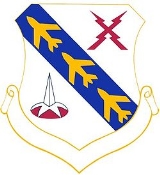
43d Air Division
Encyclopedia
The 43d Air Division assumed responsibility for the air defense of Southwestern Japan (Kyūshū
, in March 1952. The 43d also included the western part of Honshū
, and most of Shikoku
), using radar, fighter aircraft, and ground weapons to prevent or disrupt enemy air attacks. It supported numerous exercises, some involving U.S. and British naval vessels, and training for the Japan Air Self Defense Force. The division also supervised electronic countermeasures (ECM)
, and weather reconnaissance missions. In the summer of 1957, when the Nagasaki
area suffered severe flooding, the 43d assisted Japanese authorities and people by flying numerous airlift missions with helicopters and fixed-wing aircraft.
Squadrons
Kyushu
is the third largest island of Japan and most southwesterly of its four main islands. Its alternate ancient names include , , and . The historical regional name is referred to Kyushu and its surrounding islands....
, in March 1952. The 43d also included the western part of Honshū
Honshu
is the largest island of Japan. The nation's main island, it is south of Hokkaido across the Tsugaru Strait, north of Shikoku across the Inland Sea, and northeast of Kyushu across the Kanmon Strait...
, and most of Shikoku
Shikoku
is the smallest and least populous of the four main islands of Japan, located south of Honshū and east of the island of Kyūshū. Its ancient names include Iyo-no-futana-shima , Iyo-shima , and Futana-shima...
), using radar, fighter aircraft, and ground weapons to prevent or disrupt enemy air attacks. It supported numerous exercises, some involving U.S. and British naval vessels, and training for the Japan Air Self Defense Force. The division also supervised electronic countermeasures (ECM)
Electronic countermeasures
An electronic countermeasure is an electrical or electronic device designed to trick or deceive radar, sonar or other detection systems, like infrared or lasers. It may be used both offensively and defensively to deny targeting information to an enemy...
, and weather reconnaissance missions. In the summer of 1957, when the Nagasaki
Nagasaki Prefecture
is a prefecture of Japan located on the island of Kyūshū. The capital is the city of Nagasaki.- History :Nagasaki Prefecture was created by merging of the western half of the former province of Hizen with the island provinces of Tsushima and Iki...
area suffered severe flooding, the 43d assisted Japanese authorities and people by flying numerous airlift missions with helicopters and fixed-wing aircraft.
Lineage and honors
The 43d was designated a defense division and organized on 1 March 1952. It was redesignated 43 Air Division on 18 March 1955. The unit was discontinued and inactivated, on 1 October 1957.Service streamers
This unit earned the following organizational service streamers, the Korean Service.Emblem
A shield argent on a bend azure three futuramic aircraft, in bend, or, between two lightning bolts in saltire gules and a magnetic field of the last with cardinal compass points and pylon of the last. (Approved 19 December 1956)Assignments
- Japan Air Defense Force (later, Japan Air Self-Defense ForceJapan Air Self-Defense ForceThe , or JASDF, is the aviation branch of the Japan Self-Defense Forces responsible for the defense of Japanese airspace and other aerospace operations. The JASDF carries out combat air patrols around Japan, while also maintaining an extensive network of ground and air early warning radar systems...
), 1 March 1952; - Fifth Air ForceFifth Air ForceThe Fifth Air Force is a numbered air force of the United States Air Force Pacific Air Forces . It is headquartered at Yokota Air Base, Japan....
, 1 September 1954 – 1 October 1957.
Components
Wings- 8 Fighter Bomber: 1 March 1955 – 1 October 1957.
Squadrons
- 68 Fighter Interceptor68th Fighter SquadronThe 68th Fighter Squadron was one of the most long-serving Fighter Squadrons in U.S. Air Force history, remaining activated almost continually for 60 years. Known as the "Lightning Lancers", the squadron pioneered radar interception while flying the P-61 Black Widow during World War II...
: 1 March 1955 – 1 October 1957.
Aircraft / missiles / space vehicles
- F-94 StarfireF-94 StarfireThe Lockheed F-94 Starfire was the United States Air Force's first operational jet-powered all-weather interceptor aircraft. It was a development by Lockheed of the twin-seat T-33 Shooting Star trainer aircraft.-Design and development:...
, 1952 – 1953; - F-86 SabreF-86 SabreThe North American F-86 Sabre was a transonic jet fighter aircraft. Produced by North American Aviation, the Sabre is best known as America's first swept wing fighter which could counter the similarly-winged Soviet MiG-15 in high speed dogfights over the skies of the Korean War...
, 1953 – 1957; - F-100 Super SabreF-100 Super SabreThe North American F-100 Super Sabre was a supersonic jet fighter aircraft that served with the United States Air Force from 1954 to 1971 and with the Air National Guard until 1979. The first of the Century Series collection of USAF jet fighters, it was the first USAF fighter capable of...
, 1957.
Commanders
- Colonel Charles W. Stark, 1 March 1952;
- Colonel Edward N. Backus, c. 1954;
- Colonel Samuel J. Gormly Jr., by 31 December 1954;
- Colonel James M. Smelley, 9 July 1956;
- Colonel Ladson G. Eskridge Jr., 13 August 1956 – 1 October 1957.
See also
- Fifth Air ForceFifth Air ForceThe Fifth Air Force is a numbered air force of the United States Air Force Pacific Air Forces . It is headquartered at Yokota Air Base, Japan....
- List of United States Air Force air divisions

